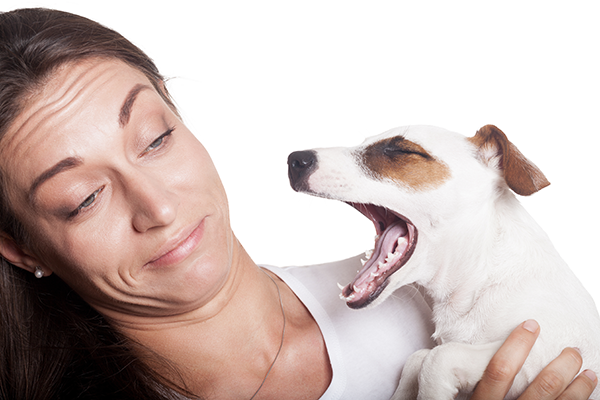[[data.name.value]]
[[metadata.defaultData.name]]
[[data.title.value]],
[[metadata.defaultData.title]],
[[data.company.value]]
[[metadata.defaultData.company]]

Why Do Dogs Sometimes Have Foul-Smelling Breath?
Dogs are renowned for their devotion, humor, and love, but one feature of their company that isn't always so charming is their breath. You're not the only one who has ever been bothered by your pet's bad breath. One of the most frequent problems that many pet owners deal with is the odd bad smell coming from a dog's mouth. This article will discuss the causes of foul-smelling breath in dogs as well as remedies for the condition.

1. Dental Health
Bad dental health is one of the most frequent causes of bad dog breath. Dogs are susceptible to dental problems such tooth decay, gum disease, and tartar and plaque accumulation, just like people. Breath issues might result from these issues. Odor-producing microorganisms may flourish in a dog's mouth when food particles and germs build up. Frequent dental care may help avoid and relieve these problems. This includes cleaning your dog's teeth and giving them dental chews or toys.
2. Diet
A dog's diet has a big impact on their breath. Certain meals, especially those that are strong in protein and poor in fiber, might lead to unpleasant smells. Furthermore, dogs that consume damaged food or scavenge it may have foul breath. It's crucial to feed your dog a healthy, balanced diet that satisfies their unique nutritional requirements.
3. Gastrointestinal Issues
In dogs, foul-smelling breath has also been linked to digestive issues. An foul odor emanating from your dog's mouth might be caused by digestive diseases such as gastritis, inflammatory bowel disease, or other conditions. In order to address the underlying issue and relieve the accompanying foul breath, these diseases often call for veterinarian care and the necessary therapy.
4. Bacterial Infections
Dogs' foul breath may be caused by bacterial illnesses of the mouth, throat, or even respiratory system. Many things, such as an impaired immune system, foreign items lodged in the throat, and untreated dental problems, may result in these illnesses. The infections may be identified and treated by a veterinarian, which should help your dog's breath.
5. kidney disease
Bad breath may sometimes indicate more serious medical conditions like renal failure. Toxins may accumulate in the circulation due to malfunctioning kidneys, giving a dog's breath an ammonia-like smell. If you think that there may be a medical issue behind your dog's terrible breath, it's imperative that you speak with a veterinarian.
6. Lack of Hydration
Dogs' foul breath may also be caused by dehydration. Dogs that don't drink enough water may get dry mouth and an overgrowth of microorganisms that cause odors. Make sure your dog always has access to fresh, clean water to avoid dehydration and the foul breath that comes with it.
Conclusion
With the right care, bad breath in dogs can frequently be avoided or controlled. The term Dog Breath Relief serves as a helpful reminder that there are ways to deal with this prevalent problem. You can make sure that your pet has fresh breath at all times by taking the required measures to support proper dental hygiene and general health.